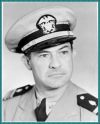21 Feb. 1901–2 Sept. 1977

Angus Morris (Monk) McDonald, college athlete and physician, was born and raised in Charlotte, the son of Angus Morris, Sr., and Ann Howard McDonald. His father was founder of the Southern Real Estate Company and chairman of the Mecklenburg County Board of Commissioners. Young Angus attended Charlotte High School and the Fishburne Military School.
After high school McDonald enrolled at The University of North Carolina, where he became a three-sport star. Only five feet, seven inches tall, he made up for his lack of size with superior quickness and athletic ability. In football he was an all-star quarterback. In 1922 he led North Carolina to a nine-win, one-loss season, including victories over arch rival Virginia and in-state foes North Carolina State, Trinity, Wake Forest, and Davidson. North Carolina's only loss that year was a controversial 18–0 defeat at Yale. McDonald's contributions that season included a 95-yard kickoff return for a touchdown that propelled the university to a 14–9 victory over North Carolina State. McDonald continued to excel in 1923, although North Carolina slipped slightly to a record of five wins, three losses, and one tie.
In basketball McDonald was a clever playmaking guard. He made the Southern Conference all-star team in 1922 and 1924 and was captain of the university team in 1923. In those three years he led North Carolina to successive win-loss records of 14–3, 15–1, and 26–0. The 1922 and 1924 teams won the Southern Conference tournament championship. The undefeated 1924 team was voted mythical national champion by the Helms Foundation. McDonald was also a standout baseball shortstop and leadoff hitter. A career .300-hitter, he was considered a professional prospect had he chosen that option. He led the 1922 team to a 19–2 record. McDonald received four university letters each in football, basketball, and baseball.
McDonald was in medical school at The University of North Carolina in the 1924–25 academic year when basketball coach Norman Shepard abruptly resigned shortly before the beginning of the season. McDonald was asked to fill the void and coached the team to an 18–5 record while carrying a full academic load. The university won another Southern Conference tournament that year, although McDonald's studies forced him to miss the post-season event.
In 1926 he transferred to the University of Pennsylvania Medical School, where he received an M.D. degree in 1928. A urologist and surgeon, McDonald served his internship at the Protestant Episcopal Hospital in Philadelphia. In 1930 he began a two-year fellowship in surgery at the prestigious Mayo Clinic in Rochester, Minn. After its completion he worked for two years at New York's Presbyterian Hospital, where he assisted noted urologist Dr. J. Bentley Squier. He also worked for a brief period at the Vanderbilt Clinic in New York.
In 1935 McDonald moved back to North Carolina to join the Greensboro practice of Dr. Fred Patterson. He remained there until June 1939, when he returned to Charlotte to help establish the Crowell Clinic. In September 1942 he became a lieutenant commander in the U.S. Navy Medical Corps. Originally stationed at Chapel Hill's Navy Pre-Flight School, he was transferred to the U.S. Naval Hospital in San Francisco in 1944. He was discharged from the navy following the end of hostilities.
After the war he resumed his urology practice in Charlotte and remained associated with the Crowell Clinic until his retirement in June 1969. He was also associated with Charlotte's Mercy Hospital. McDonald was a member of the American Urological Association, the North Carolina Medical Society, and the Charlotte Chamber of Commerce. He was inducted into the North Carolina Sports Hall of Fame in 1977.
McDonald married Mary Letitia Mebane of Greensboro in 1939. They had three children: Letitia, Ann, and Angus. All three were graduated from The University of North Carolina. McDonald continued to live in Charlotte after his retirement. He was buried at Elmwood Cemetery.